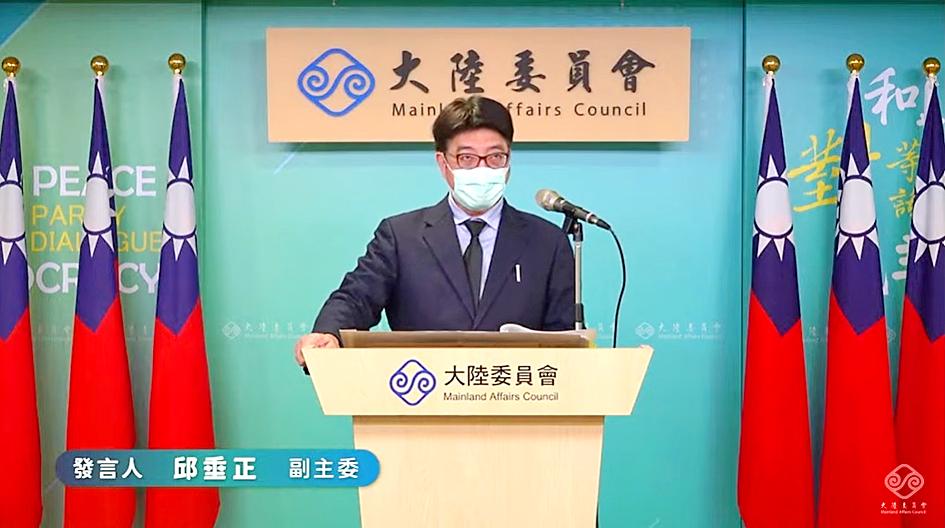A pro-unification pop song aired on Chinese television earlier this month would only further sour Taiwanese sentiment toward China, the Mainland Affairs Council (MAC) said on Wednesday.
The music video for We Sing the Same Song (我們同唱一首歌), which aired on China Central Television, features Chinese artists performing alongside Taiwanese singers Jam Hsiao (蕭敬騰), Ouyang Nana (歐陽娜娜) and Chen Li-nong (陳立農).
The lyrics were reportedly written by Taiwanese lyricist Vincent Fang (方文山), known for his collaborations with Jay Chou (周杰倫), to music composed by a Chinese musician.

Photo: Screen shot from the MAC’s online broadcast
Sung in Chinese and Hoklo (commonly known as Taiwanese), the song is about three Taiwanese siblings who go to China after their grandfather’s death to reunite with their family in China’s Fujian Province.
The sentimental music video features images of the singers intercut with a family sharing a meal, and an interlude showing Matsu (媽祖) statues on China’s Meizhou Island (湄洲島) and Yunlin County’s Beigang (北港) “gazing at each other across the Strait.”
China’s Taiwan Affairs Office said that the song was a coproduction between Cross-Strait Radio and the Taiwan Strait Watch media platform, both of which are part of the state broadcasting conglomerate China Media Group.
Artists on both sides of the Taiwan Strait “put their heart and soul” into creating this “Lunar New Year gift,” office spokeswoman Zhu Fenglian (朱鳳蓮) said on Wednesday.
The song fully demonstrates the homesickness felt by “Taiwanese compatriots,” she said, adding that the two sides “have always been one family.”
Responding to immense backlash to the song in Taiwan, Zhu said that “any lies, malicious incitement or provocations pale in comparison to feelings of affection and unity across the Strait.”
In Taipei, the MAC reiterated that the Republic of China is a sovereign nation that has never been part of the People’s Republic of China.
The Chinese Communist Party has long used shared history and culture to impose its idea of “one China,” turning purely artistic endeavors into propaganda tools, it said.
Pro-unification songs such as this would not only fail to win the approval of Taiwanese, but would actually increase antipathy toward China, it added.
Saying that Taiwanese society respects and upholds artistic freedom, the council urged Taiwanese to cherish their hard-won democracy and reject Chinese propaganda.
MAC spokesman Chiu Chui-cheng (邱垂正) yesterday called on Chinese propagandists to reconsider their strategy.
Rather than telling artists to produce “politically correct” propaganda, it should stop clamping down on artistic thought, respect freedom of expression and allow people to realize their creative potential, Chiu said.
Cross-strait exchanges should be approached rationally and pragmatically to reflect people’s voices and encourage positive development, he added.
Asked whether it was appropriate for Taiwanese artists to participate in the production, Chiu said that he “trusts that Taiwanese society has made its own evaluation.”
He added that there are regulations that must be followed when collaborating across the Strait, and those living or doing business in China must still abide by Taiwanese law.

Chinese Nationalist Party (KMT) Chairman Eric Chu (朱立倫), spokeswoman Yang Chih-yu (楊智伃) and Legislator Hsieh Lung-chieh (謝龍介) would be summoned by police for questioning for leading an illegal assembly on Thursday evening last week, Minister of the Interior Liu Shyh-fang (劉世芳) said today. The three KMT officials led an assembly outside the Taipei City Prosecutors’ Office, a restricted area where public assembly is not allowed, protesting the questioning of several KMT staff and searches of KMT headquarters and offices in a recall petition forgery case. Chu, Yang and Hsieh are all suspected of contravening the Assembly and Parade Act (集會遊行法) by holding

PRAISE: Japanese visitor Takashi Kubota said the Taiwanese temple architecture images showcased in the AI Art Gallery were the most impressive displays he saw Taiwan does not have an official pavilion at the World Expo in Osaka, Japan, because of its diplomatic predicament, but the government-backed Tech World pavilion is drawing interest with its unique recreations of works by Taiwanese artists. The pavilion features an artificial intelligence (AI)-based art gallery showcasing works of famous Taiwanese artists from the Japanese colonial period using innovative technologies. Among its main simulated displays are Eastern gouache paintings by Chen Chin (陳進), Lin Yu-shan (林玉山) and Kuo Hsueh-hu (郭雪湖), who were the three young Taiwanese painters selected for the East Asian Painting exhibition in 1927. Gouache is a water-based

Taiwan would welcome the return of Honduras as a diplomatic ally if its next president decides to make such a move, Minister of Foreign Affairs Lin Chia-lung (林佳龍) said yesterday. “Of course, we would welcome Honduras if they want to restore diplomatic ties with Taiwan after their elections,” Lin said at a meeting of the legislature’s Foreign Affairs and National Defense Committee, when asked to comment on statements made by two of the three Honduran presidential candidates during the presidential campaign in the Central American country. Taiwan is paying close attention to the region as a whole in the wake of a

OFF-TARGET: More than 30,000 participants were expected to take part in the Games next month, but only 6,550 foreign and 19,400 Taiwanese athletes have registered Taipei city councilors yesterday blasted the organizers of next month’s World Masters Games over sudden timetable and venue changes, which they said have caused thousands of participants to back out of the international sporting event, among other organizational issues. They also cited visa delays and political interference by China as reasons many foreign athletes are requesting refunds for the event, to be held from May 17 to 30. Jointly organized by the Taipei and New Taipei City governments, the games have been rocked by numerous controversies since preparations began in 2020. Taipei City Councilor Lin Yen-feng (林延鳳) said yesterday that new measures by